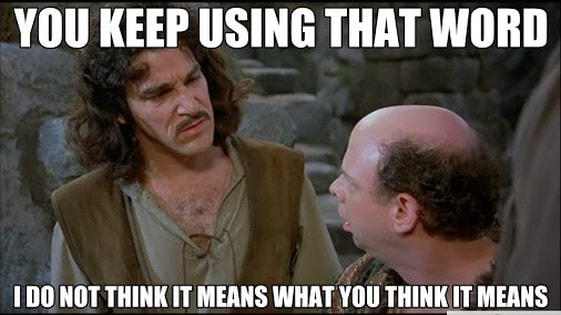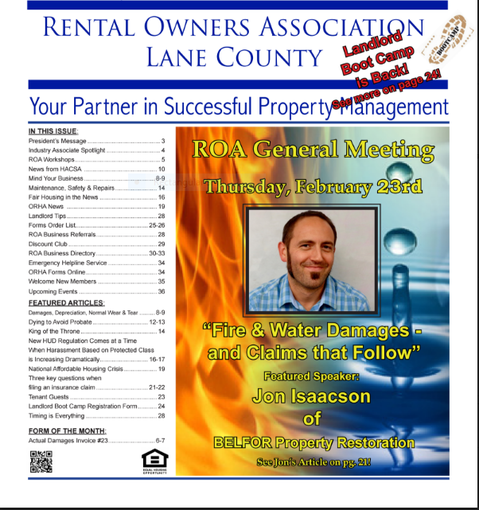 Got a point? Let's get to it. Got a point? Let's get to it. Originally published as Powerful Points for your Next Presentation in FM World Magazine, December 6, 2016. By Jon Isaacson Getting ‘buy-in’ on a particular project or initiative often rests on how well you present your case. You may also be required to speak to potential clients, or present to an external audience to share best practice with peers. Here, Jon Isaacson shares his tips for creating value rather than wasting time when addressing your audience. As a facilities manager, you are a salesperson. You are constantly marketing your value to the organisation and selling the projects that you know are critical to keeping the lights on for your company. It may not be often that the FM department is invited to make a presentation, but these meetings with executives, department heads, team meetings or even to groups outside of the organisation are a great opportunity to get your strategic message across. However, there’s a fine line between an effective presentation and a waste of time. Here are five key points: 1. Time is money Time is critical. Knowing how much time one has is an essential parameter for structuring how many points you will want to focus on. You may have at most 5-10 minutes. Your presentation will have to gain momentum quickly to address a primary aspect of the service. Highlight one aspect of the service and complement it with a story that makes it relatable to the specific audience. If you have the time, pay more attention to tone and pacing to keep the audience engaged. 2. Who is your audience? Is this a general audience? Or people that are familiar with your services? Does this group have specific needs that your company specialises in? Who you are speaking to and what areas you believe would be most effective to highlight are key components in crafting an engaging presentation. Aim to create value for your audience, and by educating it in an area that correlates to your organisation’s services, you can create indirect value for your organisation. 3. A bit about you You might be tempted to talk extensively about your history and explain every detail of what your business does, but the value of this to your audience is inversely proportionate to the amount of time you may spend explaining these personal details. Introduce the organisation with enough personal details to relate to the demographic, before swiftly moving on to the main points. 4. Tailor your style Making use of time and respecting the audience are key components to a good presentation. Know your goal for the meeting. If this presentation is for broad appeal to reach as many people as possible, then humour is always a friend. Your goal in a generic forum should be to create a knowledge void that draws additional interest from as many people as possible. For broad appeal, leave your audience with at least one nugget of value or piece of information; do this by presenting at least three key points that you believe will connect with as many people as possible. If you are aiming to grab a specific demographic or even a single client, then tailor your presentation to target them. 5. Keep practising Work on developing your skills in those soft areas such as public speaking, communication and sales. FMs do all the work behind the scenes, so it is valuable to your organisation to be able to explain operations in a clear, concise manner. You are the first point of contact for marketing the services that you and your facilities team provide to your organisation.
0 Comments
 Is what you said, what you said? Is what you said, what you said? We need to be intentional about the messages that you share – it’s not as though everyone waits in the wings for the eloquent words to spill from your lips before they move on with their personal or professional lives, but when you speak as a person in a position of leadership people are listening (even if reluctantly). There is a difference between hearing and understanding, much like there is a distinction between people hearing the content you are delivering and comprehending fully the intent of what you are attempting to communicate (read more about this phenomenon HERE). Content and tone are important when communicating as we always want to present a clear vision of how we can collaborate so that we can conquer. If you have to share some negative information there are means to deliver that message without being negative. For example, if sales are down, there is a difference between, “We are failing and corporate is going to fire us all if we don’t get it right in 30 days!” While this may be true, the likelihood that this inspires anyone to stay on the ship and bail water with you is low. “We have made some positive growth in areas X and Y, where we can be more effective would be to focus our efforts in area Z. I believe by doing so we can improve our numbers for the health of our office and make a positive impression on corporate.” No example is perfect but the role of a person in a position of leadership is to communicate information in a manner to helps the team to grasp the vision and see a clear path to what they can do to help the team improve. Often the tone of delivery is as important as the message. Leaders should not shy away from tough conversations, truth is essential to building trust and accountability in the team. Leaders are looking for ways to inform and inspire their teams at the individual level as well as for the group. Understanding when to pull someone aside to speak to them as an individual and when to address the team as a whole is important, as choosing incorrectly can have consequences. As a general rule, the toughest conversations are best to have in private. Choosing our words includes checking our messages for clarity and consistency with our values. Choosing our tone requires taking a moment to ensure we are presenting pathways to success rather than just focusing on our obstacles. Being honest about where we are is important, but in leading we want to uncover the actions that will bring us to where we need to be. Clarity requires follow up. When the content of a meeting or a message veers into potentially negative territory or the tone could be perceived by some as negative, it is important to follow up with individuals to ensure all parties understand the intent of what was being communicated. Every team member is an individual and even in good teams messages can get mixed or confused. A good leader will both make a habit of following up with individuals as well as have a sense for which messages may be taken differently than intended by others. A great follow up question is to ask, “What are you hearing me say?” or, “From what we have discussed, what are you thinking we should do with that information?” Collaboration from the top down to the bottom up is a sign of health within a team and will go a long way to ensuring everyone is empowered to move the vision forward. If you as a person in a position of leadership are not intentional about the messages you deliver, no matter how small they may seem, you are setting yourself up for trouble (read more an this HERE). Whether you believe a meeting or conversation went well or not, the habit of following up with team members on an individual level will go a long way to building clarity as well as accountability within the team. We want our messages to be clear, but the simple fact remains that not everyone hears or processes information the same way, so the next best thing is to follow up. A few quick questions to keep our messaging on point:
 Jon Isaacson published in FM World Jon Isaacson published in FM World Serving as director for our local peer to peer networking group for facilities, maintenance and risk professionals has allowed some exposure to the resources and publications in those industries. I had an article published in print late 2016 for a industry leading facilities publication, FM World. The article tilted Powerful Points For Your Next Presentation covers getting buy-in for projects as a professional whether you are presenting to internal executives or networking with external groups. As facilities managers, we all are in sales - marketing our facilities values, creating buy-in for our preventative maintenance budgets and developing collaboration for our management vision. This is true of professionals in all industries at all levels in their organizations. In our modern markets, developing our soft skills as professionals is as important as our technical proficiency. Those who have responsibilities in the arenas of facilities, maintenance and risk may find value in Local Facilities Manager's Connection (LFMC) which meets monthly in the Eugene / Springfield, Oregon area.  Or perhaps more accurately, speaking on insurance claims with various groups is always a learning experience. In nearly 15 years of working with claims response and management there are always new loss dynamics that call upon our teams to rise to the challenge as we meet the needs of our clients. Speaking with groups of insurance agents, restoration professionals or property owners, as we will be doing this month, brings to light new questions and experiences to add to our archives of interesting damages. Networking with professionals brings opportunities to learn something new. As such, I am excited about the depth of resources available in the Eugene, Oregon community for personal and professional growth. Lane County Rental Owner's Association (ROA), which happens to be the group that I will be speaking with at least twice this year, has built an impressive network of property owners who meet monthly for education. Local Facilities Manager's Connection (LFMC) is a discussion based peer to peer networking group of facilities, maintenance and risk professionals that meet to strengthen their community of professionals. Eugene Young Professionals Summit (YPS) will return this year for their second annual meeting after a successful launch of gathering over 300 participants for their local interactive event. Eugene Active 20-30 is a group of young professionals who volunteer their time and resources to raise money to make a difference in the lives of local youth in need. Are you aware of all the resources available to you in your community? Find your voice and get to work doing good things in your community. Whether it's writing, speaking, supporting or acting, put your talents to work. If you want to learn more about claims or are looking to network with property owners, join us for our presentation with Lane Rental Owner's Association and read our article, Three Key Questions When Filing An Insurance Claim, published in the ROA monthly publication. As noted in said article, "In life we don’t always need to know the answer to every question, but knowing what questions to ask and who can help us find answers are critical tools for survival." Regardless of your quest, personal or professional, value added partnerships will assist you to propel you onward towards your dreams. |
AuthorThoughts on personal and professional development. Jon Isaacson, The Intentional Restorer, is a contractor, author, and host of The DYOJO Podcast. The goal of The DYOJO is to help growth-minded restoration professionals shorten their DANG learning curve for personal and professional development. You can watch The DYOJO Podcast on YouTube on Thursdays or listen on your favorite podcast platform.
Archives
March 2023
Categories
All
<script type="text/javascript" src="//downloads.mailchimp.com/js/signup-forms/popup/unique-methods/embed.js" data-dojo-config="usePlainJson: true, isDebug: false"></script><script type="text/javascript">window.dojoRequire(["mojo/signup-forms/Loader"], function(L) { L.start({"baseUrl":"mc.us5.list-manage.com","uuid":"b9016446bd3c6a9f0bd835d4e","lid":"83282ffb9e","uniqueMethods":true}) })</script>
|
Jon Isaacson |
Connect. Collaborate. Conquer.
© COPYRIGHT 2015. ALL RIGHTS RESERVED.
|



 RSS Feed
RSS Feed